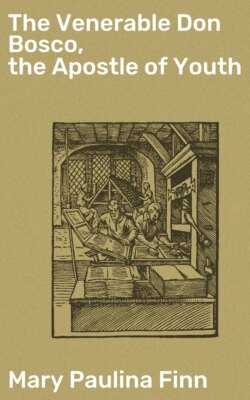Читать книгу The Venerable Don Bosco, the Apostle of Youth - Mary Paulina Finn - Страница 6
Оглавление
CHAPTER III BARTHOLOMEW GARELLI. FOUNDATION OF THE ORATORY OF ST. FRANCIS DE SALES
God, the Omnipotent, takes strange ways, simple and sometimes even apparently foolish ways of beginning a great and sublime work. On the feast of the Immaculate Conception of Our Lady, December 8, 1841, Don Bosco was vesting for Mass when he heard the sacristan scolding a strange boy who entered the church for refusing to serve at the altar. "But I don't know how," said the poor little fellow. "Then be off with you," and the sacristan gave him a rough push.
Don Bosco turned to him: "Why do you ill-treat the child?" he said gently. "Call him back; I want to speak to him." Quite ashamed the sacristan obeyed, and Don Bosco told the boy to come to him after Mass. The sacred function concluded, he made the child sit down by him and began a series of questions. "My name is Bartholomew Garelli," he answered to the first. And I want my readers to remember the name, Bartholomew Garelli, because that little boy of fifteen, fatherless, motherless, homeless, began all the great, miraculous, boy-saving works which have made Don Bosco great on earth and great in Heaven. That boy of fifteen could not read or write, he had not made his First Communion, did not even know his prayers. how Don Bosco's heart ached as he heard the pitiful story! So he sat there with his arm around the little lad and taught him to make the Sign of the Cross, explaining what it meant and giving him his first lesson on God his Father. Then he dismissed him kindly and the boy promised to return.
In a day or two Bartholomew presented himself again, and with him were two other boys seeking instruction. In the succeeding weeks the little band grew; and lo! in two months, February 2, 1842, Don Bosco had a class of twenty poor boys educating them and training them in virtue. He interested himself in their work, visited them in their homes, if they had any, provided some with lodging and food and procured places for those out of work. On Sundays he took them to church, and afterwards for recreation to some park or public place; so that all Turin soon became alive to the good he was doing.
All this time he was pursuing the highest course of theological studies, deeming it imperative to fit himself to cope with the difficult questions of the time, with doctrinal, social, philosophical and political problems that agitated individuals and nations. In fact, he was preparing himself for authorship and studying a style which he had not valued so much in his early days of flowery rhetoric, that style which would appeal most powerfully to the heart and conscience of the people. He sought to instruct, to convince, to persuade. And right here I may digress a little and tell you that he succeeded and later put forth burning doctrinal and moral treatises that ran up into the thousands and hundreds of thousands. He wrote about a hundred volumes in his own name and many others anonymously.
His studies finished Don Cafasso questioned him as to the future. "I am ready to do what ever you appoint," replied the young priest, with the docility of a child.
"Three appointments await your choice," said his director; "a curacy at Asti, a professorship of moral theology here in the Institute, or chaplaincy of the Hospital near the Refuge. Which do you prefer?"
"Whichever you think best, Father. I have only one preference—to dedicate myself to the young; but your decision will be to me the will of God."
A few weeks of vacation, and on Don Bosco's return to Turin, his guide had determined upon the chaplaincy, where he was to assist Don Borel in the management of an institute of four hundred girls. His friends still urged him to accept a benefice offered by the Archbishop. But Don Bosco replied: "And who will take care of my poor children?"
By this time they had increased to three hundred, and he had initiated the famous evening classes. The society was known as "The Oratory of St. Francis of Sales", a saint whom Don Bosco chose above all others for their patron because of his sweetness and charity; for these were the two chief virtues he required in dealing with the poor little children he so loved.
Through Don Borel two large rooms were allowed for the Oratory meetings, one serving as a chapel; but this limited space could not accommodate two thirds of the boys. However, seven months of progress ensued, with ever increasing numbers. The latter brought trouble, for the authorities of the Hospital grew suspicious of the little army, and eviction followed. The municipality in the meantime had become keenly interested in the evening classes, and through the influence of Archbishop Franzoni, they granted to Don Bosco the use of St. Martin's Church at stated hours for the little multitude, and afterward St. Peter's; but three hundred boys playing in the courtyard—and Don Bosco never repressed their fun—distracted and annoyed so many, priests and parishioners, that their destiny was soon settled.
Ejected and at last homeless, did Don Bosco's courage fail or his hope in God's providence waver? Not for a moment. Calling his grieving children together, he said with his usual cheerfulness: "My dear children, God's sky must be our roof, our next meeting in the open air, but do not be troubled; in time I shall find a home for you."
Don Bosco and Bartolomew Garelli on the Feast of the Immaculate Conception,
December, 8, 1841
